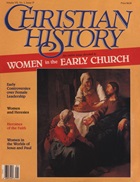
Brought up thus with modesty and discipline, she was made subject by you to her parents, rather than by her parents to you. When with the passing years she reached marriageable age, and was given to a husband, she served him as a master. She worked hard to win him to you, preaching to him by her character, by which you made her beautiful, submissively lovable and admirable to her husband.
She so endured his marital infidelities that she never had a quarrel with her husband on this account, for she still looked for your mercy upon him, that, believing in you, he might become chaste. Generally speaking, he was exceedingly kind but also bad-tempered, but she knew not to oppose an angry man by deed or word. If it happened that he had been too thoughtlessly aroused, she would explain what she had done at the right time, when he had cooled down and was calm. In a word, though many married women, who had better tempered husbands, bore on their faces the marks of shameful blows and gossiped among their friends about the way their men lived, she rebuked their tongues, half seriously, half in jest. She would advise them that, from the time they heard the marriage contract read to them, they should consider them documents which made them servants, and that thus, remembering their condition, they should not set themselves up proudly against their masters. And when they expressed amazement, knowing what an evil-tempered husband she put up with, that nothing had been heard or by any means had been made apparent, that Patricius had beaten his wife, or that they had ever fallen into the strife of domestic disagreement, and confidentially asked why, she taught the rule I have mentioned. Those who took notice of it, after a trial, thanked her. The others, kept down, suffered ….
Finally even her own husband, now in the last days of his earthly life, she won to you, and in him as a believer she had no more to complain of those things she endured in him before he believed. She was the servant of your servants, and anyone of them who knew her found much to praise in her while honoring and loving you, seeing that you were at the center of her holy way of life to which its fruits bore witness. For she had been “the wife of one man,” had paid the debt she owed to her parents, had managed her household religiously, had a reputation for good works, she had brought up her children, as often “travailing for them” as she saw them swerve from the path. Finally, Lord, for all of us [he refers to the “household” of Augustine’s friends and colleagues that Monica managed at Cassiciacum] she exercised as much care as if she were the mother of us all, and served us as if we were all her parents.
Copyright © 1988 by the author or Christianity Today/Christian History magazine.
Click here for reprint information on Christian History.

Support Our Work
Subscribe to CT for less than $4.25/month




























